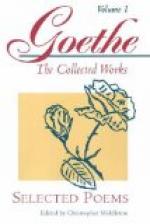Tempt no gentle night-rambles
Under the moon’s cold twilight!
Loathsome toads hold their meetings
Yonder at every crossway.
Injuring not,
Fear will they cause thee.
Oh, worthy man,
Fly from this land!
1767. ----- Third ode.
Be void of feeling!
A heart that soon is stirr’d,
Is a possession sad
Upon this changing earth.
Behrisch, let spring’s sweet smile
Never gladden thy brow!
Then winter’s gloomy tempests
Never will shadow it o’er.
Lean thyself ne’er on a maiden’s
Sorrow-engendering breast.
Ne’er on the arm,
Misery-fraught, of a friend.
Already envy
From out his rocky ambush
Upon thee turns
The force of his lynx-like eyes,
Stretches his talons,
On thee falls,
In thy shoulders
Cunningly plants them.
Strong are his skinny arms,
As panther-claws;
He shaketh thee,
And rends thy frame.
Death ’tis to part,
’Tis threefold death
To part, not hoping
Ever to meet again.
Thou wouldst rejoice to leave
This hated land behind,
Wert thou not chain’d to me
With friendships flowery chains.
Burst them! I’ll not repine.
No noble friend
Would stay his fellow-captive,
If means of flight appear.
The remembrance
Of his dear friend’s freedom
Gives him freedom
In his dungeon.
Thou go’st,—I’m left.
But e’en already
The last year’s winged spokes
Whirl round the smoking axle.
I number the turns
Of the thundering wheel;
The last one I bless.—
Each bar then is broken, I’m free then as thou!
1767. ----- Mahomet’s song.
[This song was intended to be introduced in a dramatic poem entitled Mahomet, the plan of which was not carried out by Goethe. He mentions that it was to have been sung by Ali towards the end of the piece, in honor of his master, Mahomet, shortly before his death, and when at the height of his glory, of which it is typical.]
See the rock-born stream!
Like the gleam
Of a star so bright
Kindly spirits
High above the clouds
Nourished him while youthful
In the copse between the cliffs.
Young and fresh.
From the clouds he danceth
Down upon the marble rocks;
Then tow’rd heaven
Leaps exulting.
Through the mountain-passes
Chaseth he the colour’d pebbles,
And, advancing like a chief,
Tears his brother streamlets with him
In his course.
In the valley down below
’Neath his footsteps spring the flowers,
And the meadow
In his breath finds life.
Yet no shady vale can stay him,
Nor can flowers,
Round his knees all-softly twining
With their loving eyes detain him;
To the plain his course he taketh,
Serpent-winding,




